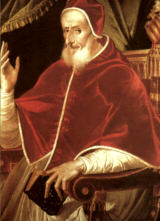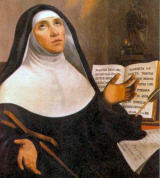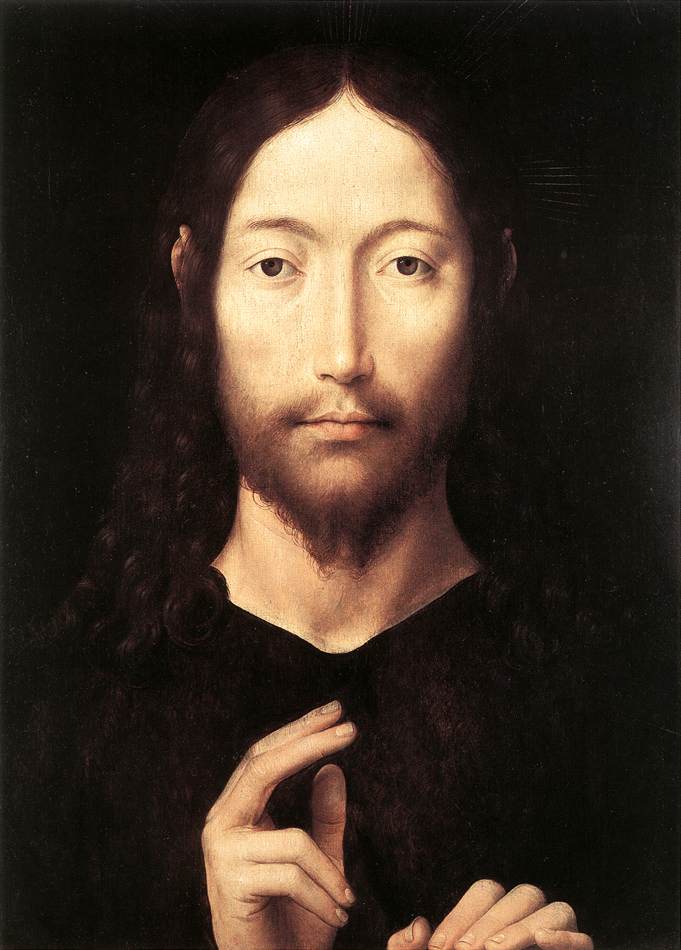27. Peace I leave with you, my peace I give to you: not as the world gives, give I to you.
CHRYS. Peace I leave with you, My peace I give to you: He says this to console His disciples, who were now troubled at the prospect of the hatred and opposition which awaited them after His departure.
AUG. He left no peace in this world; in which we conquer the enemy, and have love one to another: He will give us peace in the world to come, when we shall reign without an enemy, and where we shall be able to avoid disagreement. This peace is Himself, both when we believe that He is, and when we shall see Him as He is. But why does He say, Peace I leave with you, without the My, whereas He puts in My in, My peace 1 give to you? Are we to understand My in the former; or is it not rather left out with a meaning?
His peace is such peace as He has Himself; the peace which He left us in this world is rather our peace than His. He has nothing to fight against in Himself, because He has no sin: but ours is a peace in which we still say, Forgive us our debts (Matt 6:12). And in like manner we have peace between ourselves, because we mutually trust one another, that we mutually love one another. But neither is that a perfect peace; for we do not see into each other's minds. I could not deny however that these words of our Lord's may be understood as a simple repetition.
He adds, Not as the world gives, give I unto you: i.e. not as those men, who love the world, give. They give themselves peace, i.e. free, uninterrupted enjoyment of the world. And even when they allow the righteous peace, so far as not to persecute them, yet there cannot be true peace, where there is no true agreement, no union of heart.
CHRYS. External peace is often even hurtful, rather than profitable to those who enjoy it.
AUG. But there is a peace which is serenity of thought, tranquillity of mind, simplicity of heart, the bond of love, the fellowship of charity. None will be able to come to the inheritance of the Lord who do not observe this testament of peace; none be friends with Christ, who are at enmity with the Christians.
27. Let not your heart be troubled, neither let it be afraid.
28. You have heard how I said to you, I go away, and come again to you. If you loved me, you would rejoice, because I said, I go to the Father: for my Father is greater than I.
29. And now I have told you before it comes to pass, that, when it is come to pass, you might believe.
30. Hereafter I will not talk much with you: for the prince of this world comes, and has nothing in me.
31. But that the world may know that I love the Father: and as the Father gave me commandment, even so I do. Arise, let us go hence.
CHRYS. After saying, Peace I leave with you, which was like taking farewell, He consoles them: Let not your heart be troubled, neither let it be afraid: the two feelings of love and fear were now the uppermost in them.
AUG. Though He was only going for a time, their hearts would be troubled and afraid for what might happen before He returned; lest in the absence of the Shepherd the wolf might attack the flock: you have heard how I said to you, I go away, and come again to you. In that He was man, He went; in that He was God, He stayed.
Why then be troubled and afraid, when He left the eye only, not the heart? To make them understand that it was as man that He said, I go away, and come again to you; He adds, If you loved Me you would rejoice, because I said, I go to My Father; for My Father is greater than I. In that the Son then is unequal with the Father, through that inequality He went to the Father, from Him to come again to judge the quick and dead: in that He is equal to the Father, He never goes from the Father, but is everywhere altogether with Him in that Godhead, which is not confined to place.
Nay, the Son Himself, because that being equal to the Father in the form of God, He emptied Himself, not losing the form of God, but taking that of a servant, is greater even than Himself: the form of God which is not lost, is greater than the form of a servant which was put on. In this form of a servant, the Son of God is inferior not to the Father only, but to the Holy Ghost; in this the Child Christ was inferior even to His parents; to whom we read, He was subject. Let us acknowledge then the twofold substance of Christ, the divine, which is equal to the Father, and the human, which is inferior.
But Christ is both together, not two, but one Christ else the Godhead is a quaternity, not a Trinity. Wherefore He says, If you loved Me, you would rejoice, because I said, I go to the Father; for human nature should exult at being thus taken up by the Only Begotten Word, and made immortal in heaven; at earth being raised to heaven, and dust sitting incorruptible at the right hand of the Father. Who, that loves Christ, will not rejoice at this, seeing, as he does, his own nature immortal in Christ, and hoping that He Himself will be so by Christ.
HILARY. Or thus: If the Father is greater by virtue of giving, is the Son less by confessing the gift? The giver is the greater, but He to whom unity with that giver is given, is not the less.
CHRYS. Or thus: The Apostles did not yet know what the resurrection was of which He spoke when He said, I go, and come again to you: or what they ought to think of it. They only knew the great power of the Father. So He tells them: Though you fear I shall not be able to save Myself, and do not trust to My appearing again after My crucifixion; yet when you hear that I go to My Father, you should rejoice, because I go to one greater, one able to dissolve and change all things. All this is said in accommodation to their weakness: as we see from the next words:
And now I have told you before it comes to pass; that when it does come to pass, you may believe.
AUG. But is not the time for belief before a thing takes place? Is it not the praise of faith, that it believes what it does not see? according to w hat is said below to Thomas: Because you have seen, you has believed. He saw one thing, believed another: what he saw was man, what he believed was God. And if belief can be talked of with reference to things seen, as when we say that we believe our eyes; yet it is not mature faith, but is merely preparatory to our believing what we do not see.
When it has come to pass, then He says, because after His death they would see Him alive again, and ascending to His Father; which sight would convince them that He was the Christ, the Son of God; able as He was to do so great a thing, and to foretell it. Which faith however would not be a new, but only an enlarged faith; or a faith which had failed at His death, and been renewed by His resurrection.
HILARY. He next alludes to the approach of the time when He would resume His glory. Hereafter 1 will not talk much with you.
BEDE. He says this because the time was now approaching for His being taken, and given up to death: For the Prince of this world comes.
AUG. i.e. the devil; the prince of sinners, not of creatures; as the Apostle said, Against the rulers of this world. Or, as He immediately adds by way of explanation, this darkness, meaning, the ungodly. And has nothing in Me. God had no sin as God, nor had His flesh contracted it by a sinful birth, being born of the Virgin. But how, it might be asked, can you die, if you have no sin: He answers,
But that the world may know that I love the Father, and as the Father gave Me commandment, even so I do. Arise, let us go hence. He had been sitting at table with them all this time. Let us go, i.e. to the place, where He, Who had done nothing to deserve death, was to be delivered to death. But He had a commandment from His Father to die.
AUG. That the Son is obedient to the will and commandment of the Father, no more shows a difference in the two, than it would in a human father and son. But over and above this comes the consideration that Christ is not only God, and as such equal to the Father, but also man, and as such inferior to the Father.
CHRYS. Arise, let us go hence, is the beginning of the sentence which l, follows. The time and the place (they were in the midst of a town, and it was night time) had excited the disciples' fears to such a degree, that they could not attend to any thing that was said, but rolled their eyes about, expecting persons to enter and assault them; especially when they heard our Lord say, Yet a little while I am with you; and, The prince of this world comes. To quiet their alarm then, He takes them to another place, where they imagine themselves safe, and would be able to attend to the great doctrines which He was going to set before them.
Catena Aurea John 14



 In December of 1565, Pope Pius IV died. His one monumental achievement was the resumption and successful conclusion of the Council of Trent. The man chosen to succeed Pius IV and upon whose shoulders rested the responsibility for carrying out the decrees of the council was Michael Ghislieri, a Dominican friar. It was the late pontiff's nephew St. Charles Borromeo who had been the driving force in the election of the new pope, for he recognized that a remarkable leader would be needed if the decrees of the council were to bear fruit.
In December of 1565, Pope Pius IV died. His one monumental achievement was the resumption and successful conclusion of the Council of Trent. The man chosen to succeed Pius IV and upon whose shoulders rested the responsibility for carrying out the decrees of the council was Michael Ghislieri, a Dominican friar. It was the late pontiff's nephew St. Charles Borromeo who had been the driving force in the election of the new pope, for he recognized that a remarkable leader would be needed if the decrees of the council were to bear fruit.  Her name was originally Marie Guyard. She was married in her youth and bore a son; when her son was 12 years old, her husband died and she decided to enter the Ursuline order. At her entreaty, the authorities gave her and another nun permission to go to New France to work among the Native Americans. In 1639 she arrived in Quebec, where she was soon head of an Ursuline convent. She administered her house with great success and worked among the Native Americans with notable results. Her letters are valuable sources of French Canadian history. She wrote devotional works and catechisms, not only in French but in Native American languages. She died of hepatitis in Quebec, Canada. — See A. Repplier, Mère Marie of the Ursulines (1931).
Her name was originally Marie Guyard. She was married in her youth and bore a son; when her son was 12 years old, her husband died and she decided to enter the Ursuline order. At her entreaty, the authorities gave her and another nun permission to go to New France to work among the Native Americans. In 1639 she arrived in Quebec, where she was soon head of an Ursuline convent. She administered her house with great success and worked among the Native Americans with notable results. Her letters are valuable sources of French Canadian history. She wrote devotional works and catechisms, not only in French but in Native American languages. She died of hepatitis in Quebec, Canada. — See A. Repplier, Mère Marie of the Ursulines (1931). 
